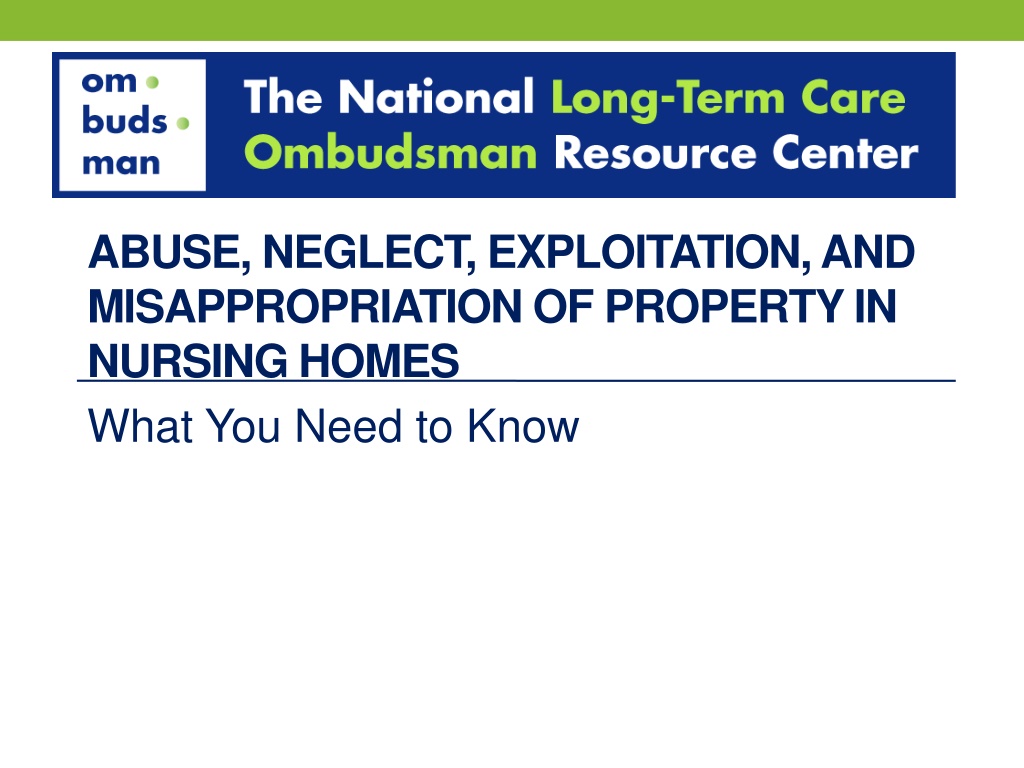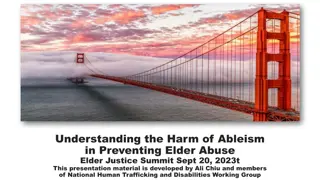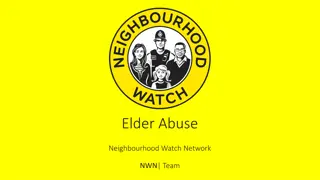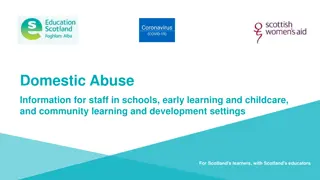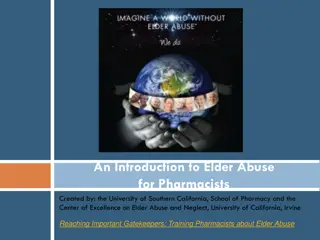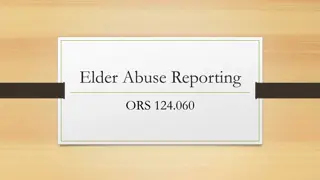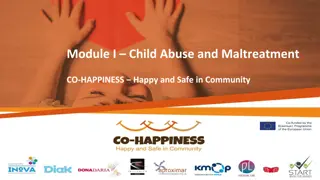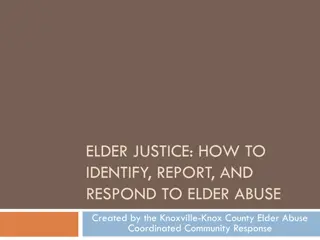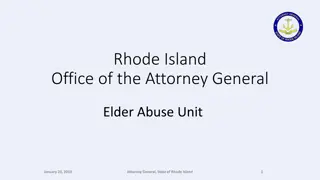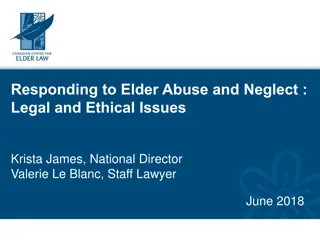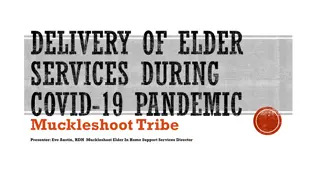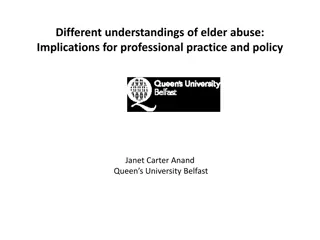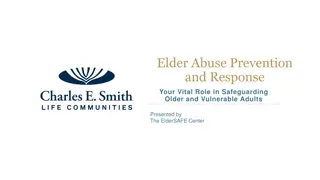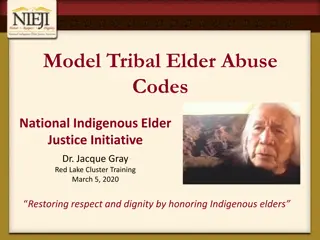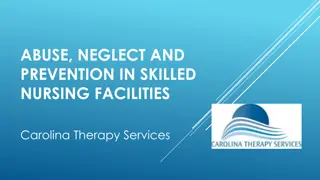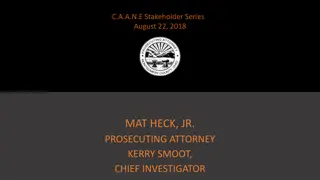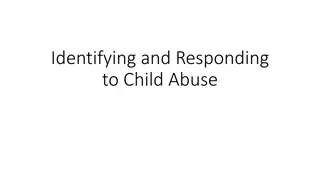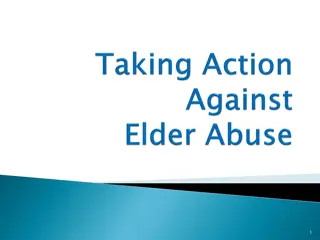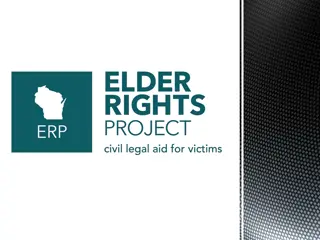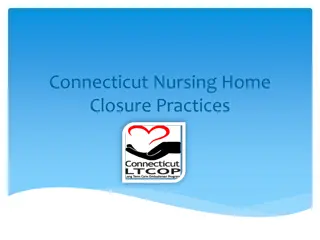Understanding Elder Abuse in Nursing Homes: Prevalence and Impact
Elder abuse, neglect, exploitation, and misappropriation of property in nursing homes are pressing issues affecting approximately 1 in 10 elders each year according to the US Department of Justice. This article sheds light on the prevalence of such abuse and its implications for the elderly population.
Download Presentation

Please find below an Image/Link to download the presentation.
The content on the website is provided AS IS for your information and personal use only. It may not be sold, licensed, or shared on other websites without obtaining consent from the author. Download presentation by click this link. If you encounter any issues during the download, it is possible that the publisher has removed the file from their server.
E N D
Presentation Transcript
ABUSE, NEGLECT, EXPLOITATION, AND MISAPPROPRIATION OF PROPERTY IN NURSING HOMES What You Need to Know
Prevalence of Elder Abuse According to US Department of Justice: Approximately 1 in 10 elders abused each year. Studies indicate the number may be higher in nursing homes and also for those who have a cognitive disability; Abused elders are 3x more likely to die prematurely than non- abused elders; and Elder abuse is dramatically underreported only 1 in 23 incidents of abuse is reported Source: US Department of Justice, Elder Justice Initiative (EJI), August 2017, https://www.justice.gov/elderjustice
Abuse in Long-Term Care All residents in nursing homes (NHs) have the right to be free from abuse, neglect, and exploitation, and misappropriation of property.* This includes freedom from bodily punishment, involuntary seclusion, and any physical or chemical restraint not required to treat your medical symptoms. Residents, families, friends, and advocates should understand residents rights to be free from abuse, facility responsibilities to protect residents from abuse, signs of abuse, and how to report abuse. *For the purpose of this presentation the term abuse will be used as a broad term to include all types of abuse.
Abuse in Long-Term Care Abuse can result in trauma, serious harm, and/or death. It is against state and Federal laws and can result in the revocation of a professional license/certification, financial penalties to the NH, and the criminal conviction of individuals. Knowing what abuse is, exercising your rights to receive quality care in a respectful environment, and learning how to take action, are ways to reduce the likelihood of an occurrence.
Abuse in Long-Term Care Reporting abuse is critical. Reporting allegations of abuse offers the resident added supports and protections, ensures an investigation and corrective and punitive actions, if indicated. You are not alone. Your Ombudsman program representative is your advocate and partner in educating, preventing and helping you to report abuse, neglect, and exploitation.
WHAT IS ABUSE, NEGLECT, EXPLOITATION, AND MISAPPROPRIATION OF PROPERTY?
What is Abuse? Abuse is the deliberate infliction of injury, unreasonable confinement, intimidation, or punishment which results in physical harm, pain, or mental anguish. Abuse also includes the deprivation by an individual of goods or services that are necessary to attain or maintain physical, mental, and psychosocial well-being.* Abuse can be verbal, sexual, physical, or mental. It also includes abuse facilitated or enabled through the use of technology. It may be caused by staff members, family members, visitors, or other residents. *42 CFR 483.5
Types of Abuse Physical abuse: hitting, pinching, shoving, force-feeding, scratching, slapping, spitting, withholding care. Mental abuse: use of verbal or nonverbal conduct which causes or has the potential to cause the resident to experience humiliation, intimidation, fear, shame, agitation, or degradation. Verbal abuse: may be considered to be a type of mental abuse and includes the use of oral, written, or gestured communication, or sounds, to residents within hearing distance, regardless of age, ability to comprehend, or disability. Sexual abuse: non-consensual sexual contact of any type with a resident, including rape, improper touching, forcing a resident to perform sexual acts or taking pictures of a resident who is partly or fully undressed.
Examples of Abuse Improper use of chemical restraints- residents with behavioral symptoms such as yelling, striking out or undressing in public are given drugs to control these actions. Improper use of physical restraints- residents who are physically active are placed in recliners, wheelchairs, or beds from which they cannot exit. Rough handling during caregiving, medication administration, or moving a resident;
Examples of Abuse Deliberatively failing to provide care or assistance necessary to prevent harm. Pushing, hitting, pinching, or grabbing a resident. Not allowing a resident to go to the bathroom. Isolating a resident from others or confining a resident to his/her room as a means of punishment or restricting a resident s movement. Taking or using photographs or recordings that would demean or humiliate a resident, including posting on social media.
Signs of Abuse Unexplained injuries such as wounds, cuts, or bruises. Restraint or grip markings. Sudden or unexplained changes in the resident s behaviors and/or activities, such as fear of a person, activity or place, or feelings of guilt or shame.
What to Do if Abuse is Occurring Right Now? There is no one right way to take action if you are experiencing physical, emotional, or mental abuse. You may be in a position to shout for help and feel safe to do so, or you may feel it s best to get help after the abuser has left. Try to remember the details and contact a trusted person as soon as possible.
If a Family Member or Friend Witnesses Abuse Shout STOP to call attention to the situation. Pay attention to the details (e.g., who, what, when, where). Immediately seek assistance from staff or stay with the resident and ask someone else to locate a staff member. Support the resident. Report the abuse.
What is Neglect? Neglect is the failure of the facility, staff, or service providers to provide goods and services to a resident that are necessary to avoid physical harm, pain, mental anguish, or emotional distress.* Neglect may or may not be intentional. Neglect is often unintentional and a result of inadequate staffing. * 42 CFR 483.5
Examples of Neglect Incorrect body positioning -- which can cause limb contractures and skin breakdown. Lack of assistance with toileting or changing of disposable briefs which can cause incontinence, increased falls, agitation, indignity, and/or skin breakdown. Lack of assistance with eating and drinking -- which can cause malnutrition and dehydration. Lack of assistance with walking which can lead to lack of mobility.
Examples of Neglect Lack of assistance with personal hygiene and appearance. Ignoring call bells or cries for help. Failure to or delayed contact to medical personnel when a resident has a significant change in condition. Untreated bed sores. Residents who wander away from the facility.
What is Exploitation? Exploitation is taking advantage of a resident for personal gain through the use of manipulation, intimidation, threats, or coercion.* Examples: Not placing a resident s funds in separate interest-bearing accounts where required. Coercing or deceiving a resident to sign documents, such as a will, purchase and sale agreement, or a bank authorization form. Stopping the resident from using their own money or withholding information about the resident s money. *42 CFR 483.5
What is Misappropriation of Resident Property? Misappropriation of resident property is the deliberate misplacement, exploitation, or wrongful, temporary, or permanent use of a resident s belongings or money without the resident s consent.* Examples: Stealing or embezzling a resident s money or personal property, such as real estate, jewelry or clothing. Forging a resident s signature and attempting to cash or cashing a check. Using a resident s property such as a TV, clothing or phone. * 42 CFR 483.5
PREVENTING ABUSE Know and Exercise Residents Rights
Prevention: Know and Exercise Resident Rights* Federal and state laws grants residents many rights. Nursing homes are required to post information about residents rights and explain them to residents. Residents have the right to be free from abuse, neglect, misappropriation of resident property, and exploitation. "This includes but is not limited to freedom from corporal punishment, involuntary seclusion and any physical or chemical restraint not required to treat the resident s medical condition. Residents have the right to voice grievances to the facility or other agency that hears grievances without discrimination or reprisal. *42 CFR 483.10
Prevention: Get to Know the Long-Term Care Ombudsman Program The Long-Term Care Ombudsman program (LTCOP) advocates for changes to improve the quality of life and care for residents. Ombudsman program representatives: Provide information about residents rights and support residents in exercising their rights; Address and resolve resident concerns; Assist in developing and supporting Resident and Family Councils; Provide information to the public regarding long-term care facilities and services, residents rights, and legislative and policy issues; Represent resident interests before governmental agencies; and Seek legal, administrative and other remedies to protect residents.
Prevention: Get to Know the Long-Term Care Ombudsman Program Nursing homes are required by federal law to provide residents with the contact information for the Ombudsman program. They are required to post this information in prominent locations throughout the nursing home and share the contact information, upon request.
Prevention: Get to Know the Long-Term Care Ombudsman Program If you suspect abuse contact the Ombudsman program. The Ombudsman program representative will: Listen and support you. Provide helpful information. Discuss ways to take action. Taking action: If you are a resident, the decision to take any action is up to you. If you are a friend or family member, the Ombudsman program will visit the resident to see if the resident wants to pursue the complaint. Resident conversations with an Ombudsman program representative are confidential. Representatives only take action on a resident concern when they have a resident s permission.* *If the resident cannot provide consent the ombudsman will work with the resident representative or follow program policies and procedures if the resident does not have a representative.
Prevention: If You Are a Resident There are many actions you can take to protect yourself and other residents against abuse: Be informed, connect with others, and speak up as soon as possible. Find out who your Ombudsman program representative is and get to know him/her. Get acquainted with NH staff- from caregivers to the administrator.
Prevention: If You Are a Resident Ask about the nursing home s grievance policy and how they prevent and protect residents from abuse. Participate in care plan meetings, request, and keep a copy of your care plan. Trust your gut if something doesn t feel right. Speak up- talk to a trusted friend, family member, staff member, or an Ombudsman program representative about a troubling situation, staff member, suspected abuse, or any other concern.
Prevention: If You Are a Resident Reach out to other residents who stay in their rooms or do not have many visitors. Participate in the Resident Council, or start one, to connect with others, voice grievances, and effect change. Invite an Ombudsman program representative to speak on abuse, neglect, and exploitation at a Resident Council meeting. Report any suspicions you have of abuse, neglect, or exploitation.
Prevention: If You Are a Family Member or Friend Encourage and assist the resident to become informed, connect with others, and to speak up. Visit regularly. Observe the resident for unusual bruising, behaviors, appearance, weight loss. Participate in or form a Family Council. Get to know the Ombudsman program.
What are Nursing Homes Required to Do? Provide individualized care to support or improve each resident s well-being. Have policies and procedures to prevent and address abuse, neglect, and exploitation. Screen, train, and supervise employees. Investigate allegations of abuse and take corrective action.
What are Nursing Homes Required to Do? Protect residents during and after an investigation. Report allegations to the state licensing and certification agency and/or adult protective services. If an alleged crime against a resident may have occurred, report to law enforcement.* Prohibit and prevent retaliation. *See CMS Survey and Certification memo 11-30-NH for more information regarding Reporting Reasonable Suspicion of a Crime in a Long-Term Care Facility (LTC) http://ltcombudsman.org/uploads/files/issues/sc-letter.pdf
To Recap- How to Prevent Abuse Know and Exercise Resident Rights Get to Know the Long-Term Care Ombudsman Program Get to Know Residents, Staff, and Visitors
Report, It's Important! By reporting immediately: The resident receives added support and protection. An investigation is conducted. Improvements in preventing abuse and protecting all residents can be made. If found guilty, a perpetrator s license can be revoked; and Criminal acts can be prosecuted. Your Ombudsman program representative canprovide information and support and help you report.
How to Report Whenever possible, put your report in writing, date it, and keep a copy. Provide as much information as you can. A thorough report will help the investigator to address the situation quickly. Remember to include: WHO The name, address, and age of the victim; the name of the facility and the people responsible for the victim s care; and the identity of the person who you believe abused, neglected, or exploited the resident.
How to Report WHAT The nature and extent of harm and any evidence of abuse, neglect, or exploitation. If you witnessed the incident, a description of what happened. If possible, and only if you have the resident s permission, document any visible signs of abuse or neglect with photographs. WHERE and WHEN The place, time, and date of the incident.
Seek Help and Report Submit your report to: The nursing home s administrator, director of nursing, and social worker. Your state survey agency. Each state has an agency responsible for the licensing, certification, and regulation of nursing homes and investigations of complaints. To locate your state survey agency visit www.ltcombudsman.org/ombudsman.
Seek Help and Report: Other Agencies In addition to reporting to nursing home staff and your state licensing and certification agency, you can also make your report to: Long-Term Care Ombudsman Program. For additional information and contact information visit: www.ltcombudsman.org/ombudsman. Adult Protective Services (APS). APS investigates reports of abuse, neglect and exploitation of elders and, in many states, individuals with disabilities. To locate APS services in your area visit: www.napsa-now.org/report. Local law enforcement, as the abuse could be a crime.
After Reporting If you are a family or friend, make sure that the abuse, neglect, or exploitation has stopped and that the resident is getting the support she/he needs. Follow up with the person or agency conducting the investigation. Ask for written copies of findings, if allowed by law.
After Reporting Substantiated findings by a State survey agency, or a finding of guilt by a court, that a nurse aide or licensed staff person has abused, neglected, or exploited a resident, or misappropriated their property must be reported to the State nurse aide registry or the State licensing board. Facilities must not engage individuals with such a finding on the State nurse aide registry, or had a disciplinary action taken against his/her professional license, meaning facilities must not hire the individual or allow them to volunteer.
What about Retaliation? There are strict federal and state laws prohibiting acts of retaliation for voicing grievances, including reporting abuse, neglect, or exploitation. An added protection is to let your Ombudsman program representative know when you have made a report. Your representative can support you and, with resident/legal representative permission, act quickly if there are any signs of retaliation. If you or your loved one experiences retaliation, you can contact the state survey agency that licenses, certifies, and regulates nursing homes. Many state oversight agencies levy hefty fines for any act of retaliation.
DISCUSSION QUESTIONS
Discussion Questions 1. What are the differences between abuse and neglect? What are some examples? 2. What can you do to reduce the likelihood of being abused? 3. You loaned money to staff because they threatened to kick you out. What can you do? 4. Why is it important to speak up if something isn't right or you suspect abuse, neglect, exploitation, or misappropriation of property? 5. How can your Ombudsman program representative help?
Additional Information The National Long-Term Care Ombudsman Resource Center (NORC): http://ltcombudsman.org/ NORC Abuse, Neglect, and Exploitation in LTC Facilities page- http://ltcombudsman.org/issues/abuse-neglect-and-exploitation-in-long-term-care- facilities NORC Nursing Homes page- http://ltcombudsman.org/nursing-homes NORC Federal Nursing Home Regulations page- http://ltcombudsman.org/library/fed_laws/federal-nursing-home-regulations Locate and Learn about the Long-Term Care Ombudsman Program: http://theconsumervoice.org/get_help The National Consumer Voice for Quality Long-Term Care (Consumer Voice) www.theconsumervoice.org Consumer Voice Nursing Home Residents page- http://theconsumervoice.org/issues/recipients/nursing-home-residents Consumer Voice Federal Nursing Home Regulations page- http://theconsumervoice.org/issues/issue_details/proposed-revisions-to-the-federal- nursing-home-regulations
Additional Information Department of Justice Elder Justice Initiative: https://www.justice.gov/elderjustice National Center on Elder Abuse (NCEA): https://ncea.acl.gov or call 1-855-500-3537
Resources to Share with Residents and Family Members http://theconsumervoice.org/uploads/files/issues/rrm- factsheet-large-font-508-compliant.pdf http://ltcombudsman.org/uploads/files/library/long-term-care- ombudsman-program-what-you-must-know.pdf
Resources to Share with Residents and Family Members http://ltcombudsman.org/uploads/files/issues/nh- consumer.pdf http://ltcombudsman.org/uploads/files/issues/nh-family- member.pdf
The National Long-Term Care Ombudsman Resource Center (NORC) www.ltcombudsman.org This project was supported, in part, by grant number 90OM002, from the U.S. Administration for Community Living, Department of Health and Human Services, Washington, D.C. 20201. Grantees undertaking projects under government sponsorship are encouraged to express freely their findings and conclusions. Points of view or opinions do not, therefore, necessarily represent official Administration for Community Living policy.
